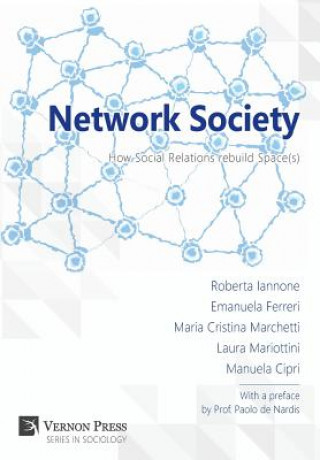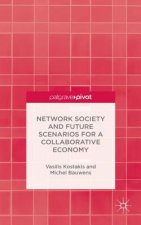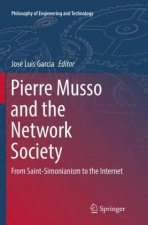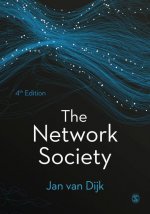
Kód: 13632398
Network Society
Autor Roberta Iannone, Emanuela Ferreri, Maria Cristina Marchetti
The present volume attempts to critically evaluate claims that modern society may be read and understood as a network. Accepting that this perspective holds some potential, the question becomes how to best capitalize on it. To ana ... celý popis
- Jazyk:
 Angličtina
Angličtina - Väzba: Pevná
- Počet strán: 220
Nakladateľ: Vernon Press, 2016
- Viac informácií o knihe

Mohlo by sa vám tiež páčiť
-

Women in the Middle Ages
17.24 € -5 % -

Network Society
27.49 € -

Network Society
58.75 € -9 % -

Network Society and Future Scenarios for a Collaborative Economy
70.22 € -

Basic Electronics for Tomorrow's Inventors
22.11 € -4 % -

Network Society
108.78 € -

Women and Power in the Middle Ages
49.31 € -

The Culture Map
16.33 € -24 % -

Pierre Musso and the Network Society
60.68 € -

Network Society
75.09 € -

Ottoman Historical Documents
133.04 € -5 % -

The Ottoman Dynasty: A History Of The Sultans Of Turkey From The Earliest Authentic Record To The Present Time, With Notes On The Manners A
32.87 € -

JOSHUA WEISSMAN TEXTURE OVER TASTE
24.65 € -1 % -

WORKING CLASS NETWORK SOCIETY
69.81 €
Darčekový poukaz: Radosť zaručená
- Darujte poukaz v ľubovoľnej hodnote, a my sa postaráme o zvyšok.
- Poukaz sa vzťahuje na všetky produkty v našej ponuke.
- Elektronický poukaz si vytlačíte z e-mailu a môžete ho ihneď darovať.
- Platnosť poukazu je 12 mesiacov od dátumu vystavenia.
Viac informácií o knihe Network Society
Nákupom získate 250 bodov
 Anotácia knihy
Anotácia knihy
The present volume attempts to critically evaluate claims that modern society may be read and understood as a network. Accepting that this perspective holds some potential, the question becomes how to best capitalize on it. To analyze society as a network means to respond not only to the "actual needs", but also to highlight the "opportunities" and the "utilities", and to investigate whether society is increasingly relational or just perceived as such, as e.g. digital "social networks" and related concepts exemplify. From a strictly scientific perspective to answer the question "how to" read society as a network means to ask ourselves: a) if the conceptual categories (especially the concepts of structure and exchange) and the paradigms of traditional analysis (holism and individualism, both in the functionalist and the conflictive versions) are still sufficient; b) if new conceptual categories/theories/instruments are needed to represent more properly the reality we face: to investigate it, to explain it or, at least, to understand it. Starting from a reflection on already established social networks (Scott, 2003), the fundamental differences between groups and networks (Vergati, 2008), the logics of networks (Serra, 2003) as well as social capital formation and links (Di Nicola, 2006; Mutti, 1998), we seize the spatial dynamics, seemingly following opposite paths, but which revert to a common denominator: de-spatialization and re-spatialization, namely the processes of dematerialization of space(s) and its reconstruction by specific relational dynamics and forms. The study of networks is therefore not attributable to a single theory but to several theories converging towards a unique perspective (spaces) and logical reasoning (Serra, 2001) each one with its own uniqueness. The strength of this volume and the difference with respect to other attempts at explaining the Network Society lies in the multidimensional and interrelated perspectives it offers emerging from converging multidisciplinary perspectives (sociological, anthropological and linguistic), and from applications that the Network Society provides, namely, international (European Governance), institutional, public (linguistic landscape of the city of Rome) and mediated ones (communication technology).
 Parametre knihy
Parametre knihy
Zaradenie knihy Knihy po anglicky Society & social sciences Society & culture: general Social issues & processes
100.36 €
- Celý názov: Network Society
- Podnázov: How Social Relations Rebuild Spaces
- Autor: Roberta Iannone, Emanuela Ferreri, Maria Cristina Marchetti
- Jazyk:
 Angličtina
Angličtina - Väzba: Pevná
- Počet strán: 220
- EAN: 9781622730407
- ISBN: 1622730402
- ID: 13632398
- Nakladateľ: Vernon Press
- Hmotnosť: 534 g
- Rozmery: 163 × 238 × 24 mm
- Dátum vydania: 14. June 2016
Obľúbené z iného súdka
-

The Second Sex
7.20 € -24 % -

White Tears Brown Scars
10.14 € -24 % -

When Helping Hurts
13.79 € -20 % -

The Beauty Myth
6.08 € -24 % -

Violence and the Sacred
40.48 € -

Wolf Nation
32.87 € -13 % -

Good Immigrant
13.39 € -

Stuart
13.49 € -14 % -

Population Wars
16.33 € -18 % -

The Lucifer Effect
16.02 € -20 % -

Superforecasting
10.85 € -24 % -

Sensate Focus in Sex Therapy
40.89 € -

Pleasure Activism
17.04 € -19 % -

Drama Of Being A Child
11.05 € -23 % -

Alcoholics Anonymous Big Book
24.85 € -

Vulture
17.34 € -13 % -

Regarding the Pain of Others
12.17 € -23 % -

Rational Optimist
16.43 € -22 % -

Poor Economics
11.15 € -22 % -

Violence
11.66 € -19 % -

Psychopath Free
20.29 € -4 % -

Shock Doctrine
15.11 € -21 % -

The Divide
11.97 € -16 % -

Silently Seduced
12.78 € -19 % -

The Feminine Mystique
10.04 € -22 % -

Toxic Parents
14.30 € -23 % -

Soft Power
14.50 € -20 % -

Third Wave
8.62 € -24 % -

Posthuman Feminism
21.40 € -

No Logo
12.98 € -9 % -

Courage To Heal Workbook
25.87 € -8 % -

Illness as Metaphor and AIDS and Its Metaphors
14.30 € -23 % -

Down and Out in Paris and London
10.04 € -22 % -

Dopesick
10.14 € -24 % -

Presence
14.91 € -22 % -

Facing the Shadow
32.97 € -18 % -

Last Days at Hot Slit - The Radical Feminism of Andrea Dworkin
18.87 € -22 % -

A Room of One's Own
8.31 € -20 % -

Future Shock
9.02 € -21 % -

Problem that Has No Name
2.53 € -23 % -

Your Silence Will Not Protect You
15.31 € -23 % -

Social Animal
14.30 € -23 % -

Attention Merchants
12.27 € -17 % -

Who Cooked Adam Smith's Dinner?
12.17 € -23 % -

Stiff Upper Lip
12.17 € -23 % -

Power Elite
18.66 € -19 % -

Eternal Treblinka
22.82 € -

Critical Race Theory (Third Edition)
20.19 € -6 % -

Go Ask Alice
10.04 € -22 %
Osobný odber Bratislava a 2642 dalších
Copyright ©2008-24 najlacnejsie-knihy.sk Všetky práva vyhradenéSúkromieCookies



 21 miliónov titulov
21 miliónov titulov Vrátenie do mesiaca
Vrátenie do mesiaca 02/210 210 99 (8-15.30h)
02/210 210 99 (8-15.30h)